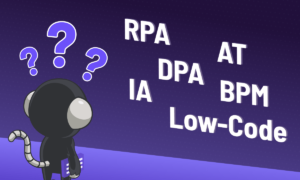Do you need RPA bots or DPA platforms? Do you need to modernize your BPM with AI decision intelligence, build low-code apps, or make your automated testing frameworks more process-aware?
Enterprises face a buzzsaw of buzzwords when entering this forest of process automation options. Leading analyst firms have identified several unique technology spaces relating to the automation of business processes, but the lines between them become blurrier every day.
Looking at the amount of investment and sales hype happening in process automation, along with the analyst, consulting and platform vendor activity of segmenting so many products into arbitrary markets, it’s not hard to see why all this jockeying for position is happening. There’s a lot of money to be made in prescribing innovative solutions to fit such complex problems.
Clearly, any business must become more agile, responsive and efficient in every operational aspect of fulfilling customer demand in order to face down competitive pressures.
Every business process consists of many tasks, where automation would benefit the business if the work happened faster and used less resources to complete. And every automation approach must execute these tasks in a way that maintains context and respects the business goals of the process.
Therefore, I’d like to posit a way to see both the trees of automation, and the forest of process complexity at the same time.
Proposing xPA: Any-process-automation
xPA (where x means ‘Any’ process automation, or even eXtreme process automation, if that’s your style) is not another software market segment.
xPA is the practice of understanding and codifying commonalities between all process automation tools and the enterprise’s application estate, in order to produce more reusable process automation assets.
Read the entire post here: https://robocorp.com/blog/xpa-clearing-confusion-through-any-process-automation




